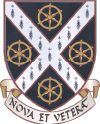Catz Exchange Conference 2026: Students Take the Floor
The Catz Exchange Conference (CatzXCon) returned this week, bringing together students from across the College to present their research, share ideas, and test their thinking in public.

Held in the Mary Sunley Building and hosted by Catz Senior Tutor, Professor Andrew Dickinson, CatzXCon was structured around a series of themed panels, each chaired by Fellows. Over the course of the day, undergraduate and postgraduate speakers presented on a wide range of topics, from artificial intelligence and energy systems to architecture, health and the environment.

One student explored how visual aesthetics shape our experience of coffee, using it as a way of thinking about craft and perception beyond academia. Another revisited the Minoan civilisation, challenging long-held assumptions about what we think we know of ancient Crete. There were presentations on Indian federalism and the changing status of Jammu and Kashmir, and on the biology of sleep, including its role in clearing waste from the brain and its links to long-term health. Elsewhere, students examined architectural conservation in Oxford, the cultural role of embroidery as a form of archive, and the tension between energy sufficiency and efficiency in responding to the climate crisis.

Other presentations explored ageing and lifestyle, heart regeneration, antibiotic resistance, and the emerging use of brain organoids in understanding neurological conditions, a reminder of both the ambition and relevance of the work underway at the College.

The discussions themselves were a vital part of the day. Chairs guided conversation, and audience members were willing to challenge assumptions and explore ideas further. There was also something quietly significant in the act of standing up and speaking at all. For many, this was a first experience of presenting their work in a public forum. That willingness to step forward, and to make ideas visible and invite response, is an important part of academic life, and one that CatzXCon actively encourages.

The conference concluded with a drinks reception and dinner in Hall. Now firmly established in the College calendar, CatzXCon continues to grow in confidence and ambition, a reminder that Catz is not only a place where knowledge is received, but where it is actively made and shared.
***
Find out more about student life at Catz, here.

